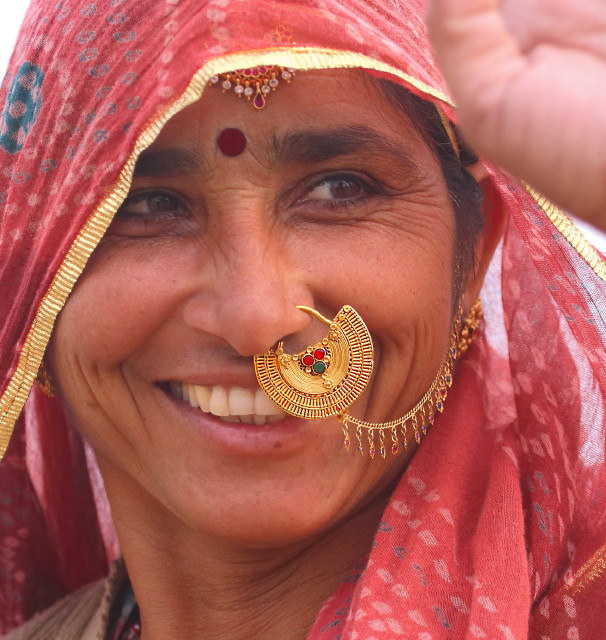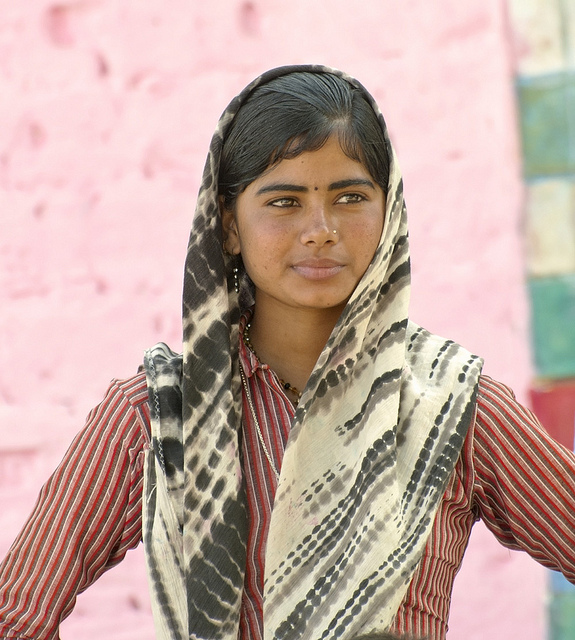Idioms Continued Posted by Rachael on Jul 21, 2018 in Hindi Language, Uncategorized
In my previous post, I discussed idioms that have to do with facial features. Despite the seeming randomness of this choice, I was taught by one of my greatest Hindi teachers that categorizing idioms and learning them as part of those categories makes it easier. And, he was right, of course! The same goes for learning new vocabulary. So, without further ado, let’s dive into more idioms concerning facial features that we didn’t have a chance to discuss in my previous post.
Idioms Concerning Facial Features / चहेरे के अंगों से जुड़े मुहावरे
Part 2 (दूसरा भाग)
नाक (naak, the nose, fem. noun)
x की नाक काटना (literally: to cut off someone’s nose, figuratively: to disgrace or dishonor someone)
उदाहरण/udaaharan (example): मेरे पिता जी रीति-रिवाज़ पालने का बहुत विश्वास करते हैं; वे मानते हैं कि अगर मैं दूसरे समुदाय के व्यक्ति से ब्याह करूँ, तो (मैं) उनकी नाक काट दूँगी । (Mere pitaa ji reeti-rivaaz palnee kaa bahut vishvaas karte hain; ve maante hain ki agar main doosre samudaay ke vyakti se byaah karuun, to (main) unki naak kaat doongi).
My father very much believes in upholding tradition and customs; he thinks/believes that, if I marry someone from another community, I’ll disgrace him.
*Similarly, the related idiom नाक कटना/naak katnaa means “for the nose to be cut/to be disgrace or dishonored” and is just an intransitive variant of the above transitive verb (that is, a verb that takes an object). So, you could also say something like:
उदाहरण/udaaharan (example): तुम्हारे बेटे की इन बातों से हमारे परिवार की नाक कट गयी है । (Tumhaare bete ki in baaton se humaare parivaar ki naak kat gayi hain).
Our family has been disgraced/dishonored by your son’s words.
नाक में दम करना (literally: to put life/breath in one’s nose, figuratively: to completely pester or bother someone)
उदाहरण/udaaharan (example): मुझे तो बच्चे बिल्कुल अच्छे नहीं लगते; उनको चिल्लाते चिल्लाते सुनकर जल्द ही मेरी नाक में दम कर देता है (Mujhe to bacche bilkul acche nahin lagte; unko chillaate chillaate sunkar jald hi meri naak me dam kar detaa hai).
I really don’t like children at all; listening to them screaming away bothers/annoys me very quickly.
नाक का बाल होना/naak kaa baal honaa (literally: to be the hair in someone’s nose, figuratively: to be beloved and indispensable to someone in a non-romantic way, such as a close friend or adviser/righthand man).
उदाहरण/udaaharan (example): ऐसी दोस्ती बहुत कम मिलती है जिस में एक शख़्स दूसरे पर बिल्कुल निर्भर करता है; जैसे शोलय में, वीरू जय की नाक का बाल था । (aisi dosti bahut kam milti hai jis me ek shakhs doosre par bilkul nirbhar kartaa hai; jaise Sholay me, Veeru Jai ki naak kaa baal tha).
You don’t often come across such friendships in which one person completely depends on the other; like in Sholay (a famous Hindi Western film), Veeru is Jai’s righthand man/beloved friend.
होंठ (honth, the lip(s), masc. noun)
होंठों पर होना or नचाना/honthon par honaa, nachaanaa (literally: to be on/dancing on the lips, figuratively: to be on the tip of the tongue).
उदाहरण/udaaharan (example): मुझे ऐसा महसूस बिल्कुल अच्छा नहीं लगता जब एक शब्द एकदम होंठों पर है/नचा रहा है, लेकिन फिर भी मन में नहीं आ रहा है ! (Mujhe aisaa mehsoos bilkul acchaa nahin lagtaa jab ek shabd ekdam honthon par hai/nachaa rahaa hai, lekin phir bhi man me nahin aa rahaa hai).
I absolutely dislike that feeling when a word is on the tip of your tongue, but you still can’t think of it!
होंठों में कहना (literally: to say in one’s lips, figuratively: to say in a low voice).
उदाहरण/udaaharan (example): वह बिल्कुल होंठों में कह रहा था ; इसलिए मुझे उसकी सुनाई नहीं दी। (Voh bilkul hothon me keh rahaa thaa; isliye mujhe uski sunaai nahin di).
He was speaking in a very low voice; therefore, I couldn’t hear him.
मुहँ (munh, masc. noun, lips/face)
*It’s important to take note that the masculine noun मुँह/muunh can mean both mouth, lips and face, but more often means mouth or lips. When you want to be very specific and clear in what you’re referring to, use चेहरा/chehraa to signify “face.”
मुँह काला हो जाना/मुँह काला करना/munh kaalaa ho jaanaa/munh kaalaa karnaa (literally: for one’s face to blacken, to blacken someone else’s face, figuratively: to be disgraced/dishonored or to disgrace/dishonor someone else).
उदाहरण/udaaharan (example): सभी को तू-तू मैं-मैं करके तुम अपना ही मुँह काला कर बैठे हो । (sabhi ko tu tu main main karke tum apnaa hi munh kaalaa kar baithe ho).
After squabbling (can also mean “to insult”) with everyone, you’ve only disgraced yourself.
मुँह खुले का खुला रह जाना/munh khule kaa khulaa reh jaanaa (literally: for the mouth/face to remain completely open, figuratively: to remain with mouth agape out of astonishment/surprise).
उदाहरण/udaaharan (example): अपने घर में दाख़िल होते ही, उसको बहुत आशर्य हुआ कि उसके सारे दोस्त वहाँ पे इकट्ठे हुए “जन्मदिन मुबारक हो” गा रहे थे –यह सब देखकर, उसका मुँह खुले का खुला रह गया । (Apne ghar me daakhil hote hi, usko bahut aashcharya huaa ki uske saare dost vahaan pe ikatthe hue “janmadin mubaarak ho” gaa rahe the –yah sab dekhkar, uskaa munh khule kaa khulaa rah gaya).
As soon as she entered her home, she was very surprised to find all of her friends gathered there, singing “Happy Birthday”–seeing all of this, her mouth remained agape (with astonishment).

Build vocabulary, practice pronunciation, and more with Transparent Language Online. Available anytime, anywhere, on any device.






